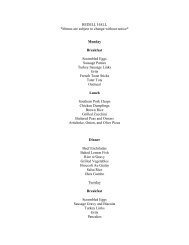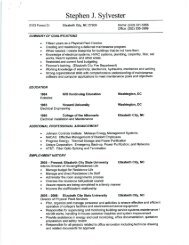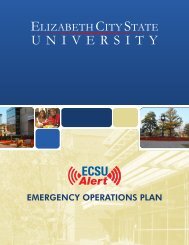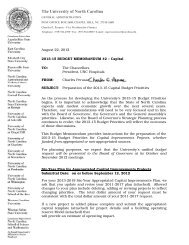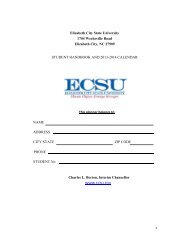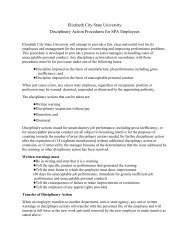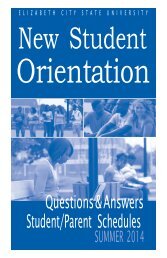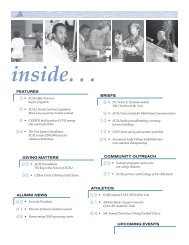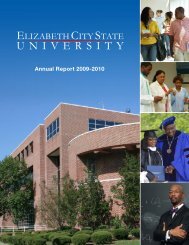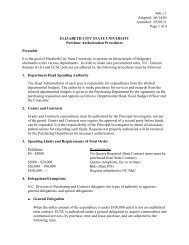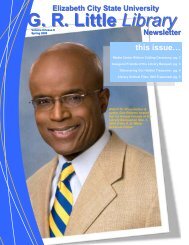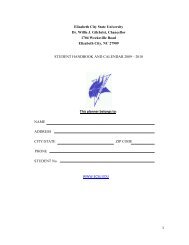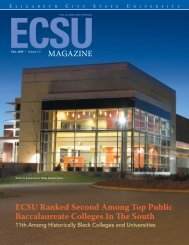Fact Book 2012-2013 - Elizabeth City State University
Fact Book 2012-2013 - Elizabeth City State University
Fact Book 2012-2013 - Elizabeth City State University
You also want an ePaper? Increase the reach of your titles
YUMPU automatically turns print PDFs into web optimized ePapers that Google loves.
Page 6 of 51<br />
Historical Highlights<br />
<strong>Elizabeth</strong> <strong>City</strong> <strong>State</strong> <strong>University</strong> was founded on March 3, 1891, when House Bill 383 was enacted<br />
by the North Carolina General Assembly, establishing a normal school for the specific purpose of<br />
“teaching and training teachers of the colored race to teach in the common schools of North Carolina.”<br />
The bill was sponsored by Hugh Cale, an African American representative from Pasquotank County.<br />
Between 1891 and 1928, curricula and resources were expanded under the leadership of Peter<br />
Wedderick Moore. Enrollment increased from 23 to 355 and the faculty from 2 to 15 members by the<br />
time Dr. Moore retired as President-Emeritus on July 1, 1928.<br />
Under the leadership of John Henry Bias, the second president, who served from July 1, 1928 until<br />
his death on July 15, 1939, the institution was elevated from a two-year normal school to a four-year<br />
teachers college in 1937. The institution’s name was officially changed to <strong>Elizabeth</strong> <strong>City</strong> <strong>State</strong> Teachers<br />
College on March 30, 1939, and the mission was expanded to include the training of elementary school<br />
principals for rural and city schools. The first Bachelor of Science degrees in Elementary Education<br />
were awarded in May 1939.<br />
The number of majors increased between 1959 and 1963 from a single elementary education major<br />
to 12 additional academic majors. The college was granted full membership in the Southern Association<br />
of Colleges and Schools in December 1961. Its accreditation has since been reaffirmed. The name<br />
changed from <strong>Elizabeth</strong> <strong>City</strong> <strong>State</strong> Teachers College to <strong>Elizabeth</strong> <strong>City</strong> <strong>State</strong> College by the General<br />
Assembly in 1963. Effective July 1, 1969, the college became <strong>Elizabeth</strong> <strong>City</strong> <strong>State</strong> <strong>University</strong>. In 1971,<br />
the General Assembly redefined The <strong>University</strong> of North Carolina system with sixteen public<br />
institutions. Including ECSU, those institutions are constituents of The <strong>University</strong> of North Carolina<br />
(July 1972).<br />
Currently, ECSU offers 37 baccalaureate degree programs and four master's degree programs in<br />
Elementary Education, Biology, Mathematics and School Administration. ECSU also offers a doctor of<br />
pharmacy degree in collaboration with the Eshelman School of Pharmacy (UNC- Chapel Hill). ECSU<br />
has earned national acclaim for its academic advances: In 2007, Diverse Issues in Higher Education<br />
ranked ECSU #1 among Historically Black Colleges and Universities for its black male student athlete<br />
graduation rate. Between 1999 and <strong>2013</strong>, ECSU repeatedly earned national acclaim in U.S. News and<br />
World Report Magazine's ranking of best colleges in the south. The U.S. News and World Report's <strong>2013</strong><br />
Edition of Best Colleges ranked ECSU as third in the Top Public Schools Regional Colleges (South)<br />
category and #20 among the nation's Historically Black Colleges and Universities. <strong>Elizabeth</strong> <strong>City</strong> <strong>State</strong><br />
<strong>University</strong> also ranked #1 among baccalaureate colleges in Washington Monthly's <strong>2012</strong> college<br />
rankings.<br />
In 2000, ECSU began designing capital improvement projects funded by $46.3 million from the<br />
state's Higher Education Bond Referendum. The results were a Physical Education/Field House (2003),<br />
<strong>University</strong> Suites, a residence hall (2004), the Walter N. Henrietta B. Ridley Student Complex (2005).<br />
Viking Village, a student residence hall adjacent to the campus main entry, resulted from a universityprivate<br />
partnership (September 2004). In July 2004, the NC General assembly allotted $28 million to<br />
construct facilities for the Pharmacy Complex which opened in the fall of 2010. Construction of the<br />
Willie and Jacqueline Gilchrist Education and Psychology Complex began in July 2010 and was<br />
ECSU FACT BOOK <strong>2012</strong>-<strong>2013</strong>



